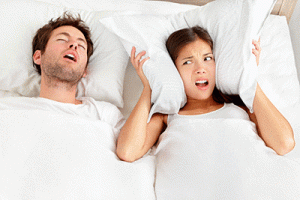Oral Dental Devices Can Control Snoring And Sleep Apnea
Do you snore like a chainsaw? If you’re single it may not be as easy to find out without doing a sleep study monitored by a medical professional. If your partner complains of your loud snoring, it may be a symptom of sleep apnea, which is when you struggle to breathe when sleeping. Perhaps someone has gone so far as to tell you that you seem to stop breathing occasionally during the night? That is also part of sleep apnea. Sleep apnea can be dangerous for your health as the stress of struggling to breathe means that your brain is being deprived of oxygen and can affect the health of your heart and increase blood pressure, as well as contribute to the onset of diabetes.
What Is A CPAP And How Does It Work?
One of the most popular methods for controlling sleep apnea is to use a CPAP (continuous positive airway pressure). This involves the use of a small air pump conveying air to a mask that may cover the mouth and nose, or just the nose. The CPAP ensures that the user has greater oxygen flow consistently throughout the sleep period, and is reported to ease snoring and provide better quality sleep to the user. The most common complaint, however, is about the noise of the CPAP machine itself. Despite numerous updates, the CPAP still has a motor that will run all night, and many users and/or their significant others still complain about the noise the machine makes. Another complaint about the CPAP is general discomfort from the mask, and the inability to sleep comfortably on your side because of the mask and tubes that connect the pump to the mask. Many people continue to enjoy the CPAP and report more restful sleep, and also promote the CPAP because many health insurance policies will cover the cost of the product (although users are still responsible for product maintenance).

How Can I Control Snoring And Sleep Apnea Without A CPAP?
Some products claim to stop snoring using sprays or tablets. The idea behind these is to numb the throat and that by relaxing the throat and soft palate, snoring will cease. These are effective for a brief period, but often must be reapplied throughout the night, meaning the user will still not sleep restfully. One of the most popular ways to control snoring and sleep apnea without the use of a CPAP is by using what is essentially a mouthguard similar to those used by athletes in contact sports to prevent dental damage, with the exception that these mouthguards extend the lower jaw just enough to open the airway and allow for ease of breathing. I have used one of these devices for more than four years now and have had consistently better sleep, and another benefit (according to my wife) is that my snoring is much quieter and easily ignored. There are many different manufacturers of this particular type of dental device, with SnoreRx being the most popular, followed by Zyppah, Pure Sleep, and ZQuiet. Upon receipt, the customer customizes the product by soaking it in hot water and then biting down on the softened silicone to create a dental impression. This process is repeated until the fit is secure and comfortable. After that, the lower tray can be slid forward in one-millimeter increments until the lower jaw extends just far enough to open the airway. This device is inserted every evening and removed during the day. With such frequent usage and even with proper cleaning bacteria can still build up and it recommended that the device be swapped out with a new one every 12-24 months. Prices vary between brands, and SnoreRx offers a discount if customers order two at a time. Some critics say that the use of such devices can alter the positions of peoples’ teeth and jaws resulting in orthodontic issues. When first using the product, consumers may feel soreness because the lower jaw may pull against the adjustment overnight, but after a week or so the soreness should dissipate. Also, in the morning it may take some time for the jaw to reposition itself and consumers may feel a little discomfort while eating breakfast during the time it takes to acclimate to the product.
How Can I Control Snoring And Apnea Without Using Any Devices?
Snoring and sleep apnea can have many possible causes that, when addressed, may help eliminate snoring and sleep apnea. Some possible causes that are easiest to adjust include sleeping position (try sleeping on your side instead of your back), avoiding food and beverages before bed, and avoiding alcohol and drugs before bed (including medication to help you sleep). Nasal strips are another possible way to alleviate snoring which works by opening nasal passages for better airflow. More serious causes can be lack of exercise, poor diet and being overweight.
Consulting with a sleep specialist and doing a sleep study is not always the most popular option, but will be the most thorough examination and provide the most conclusive results and plan. Snoring and sleep apnea can be treated in different ways, and most are available over-the-counter, but some may require approval from a qualified physician or dentist. Check with your doctor and dentist before deciding which treatment is best for you. Sweet dreams!
About Our Guest Writer:
M.R. Felker, Content Writer. M.R. Felker lives near San Diego, travels frequently with his amazing wife, and likes to live dangerously by accepting candy from strangers.

Advertising Disclosure: This post may contain promotional links. Watch the Review may be compensated if you use these links.

